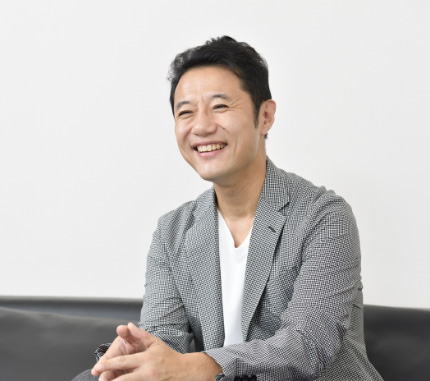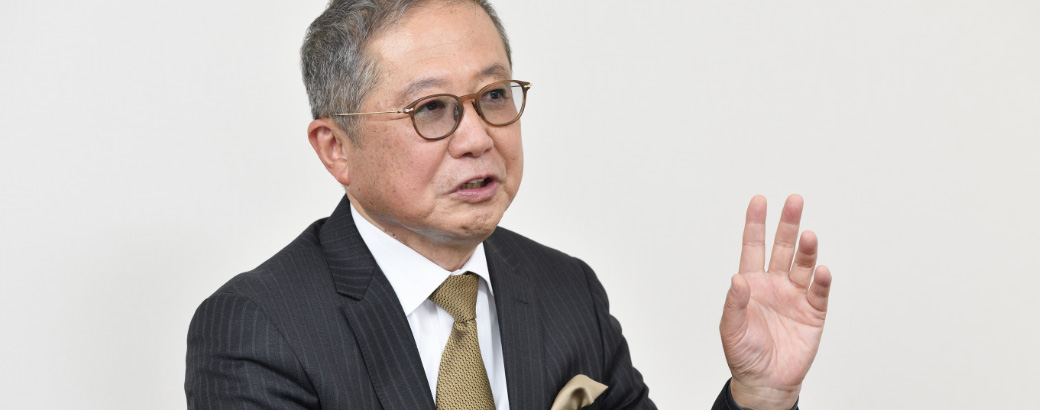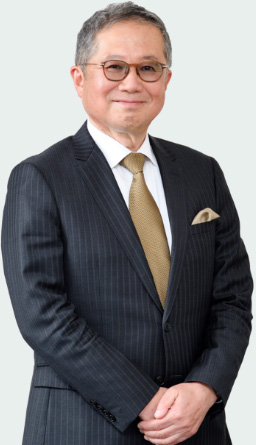In addition to further growing its existing businesses, the Benesse Group is set on making inroads into new areas in its new medium-term business plan, including expanding its businesses overseas. In a conversation touching on the concept of “ambidexterity” in business, Prof. Akie Iriyama of Waseda Business School and Mr.Tamotsu Adachi, Chairman and Representative Director of Benesse Holdings (position as of March 2022), talk about the challenges facing Benesse.
Ambidexterity: The goal of the new medium-term business plan
Adachi
There are three key issues that our new medium-term [business] plan addresses.
The first issue, as we head toward 2030, is the kind of image we're aiming for with the Benesse Group. To deal with that, we've been looking at the two pillars of our business—education and nursing care—and what kind of contribution we want to make to solve social issues. The second issue is recovering from the impact of COVID-19 as soon as possible.
And the third issue is how we specifically want out business to grow in the long run. The Benesse Group has very strong core businesses, and we think it's crucial to first evolve those. At the same time, in this time of major upheavals in the business world, we mustn't overlook taking on challenges in new areas. And balancing these two aspects is the crux of the new medium-term plan. So the third issue is simply the part of the plan in which we utilize what you mentioned, Professor Iriyama: ambidexterity.

Iriyama
Ambidexterity in business is a theory embracing a high-level approach to business that balances the quest for knowledge and the deepening of knowledge, enabling organizations to achieve the innovation That's crucial in today's world of rapid change. The quest for knowledge involves giving birth to new ideas, which is the first step in all innovation, by combining disparate areas of knowledge. The deepening of knowledge is the process of digging deeper into an idea arising from the quest for knowledge and monetizing it. In my opinion, Japanese firms currently lack ambidextrous management.
Firms generally concentrate on short-term profits and the stability and viability of their businesses, which makes them lean toward the deepening of knowledge and devoting their business resources to that. This is referred to as the success trap, and it hinders innovation. For this very reason, it's important to apply ambidextrous management, which is to continuously engage in the quest for knowledge and to broaden that knowledge while deepening it. I was so pleased when I knew that your new medium-term plan recognized the value of ambidextrous management.
Adachi
Because the Benesse Group already has a very strong business model for its core businesses, our problem was being unable to find new ideas. That's why we're aiming to strengthen the quest for knowledge in our new medium-term plan.
First in terms of evolving our core businesses, it seemed to us that if we merely dug more deeply into existing organic areas, our expansion would be limited. So we focused on a more inorganic growth strategy by considering new possibilities we could pursue even in our existing businesses. In short, in the quest for knowledge, we came up with using our assets while expanding our existing businesses into neighboring areas.
On the other hand, in terms of moving into new areas, we're trying out new businesses by leveraging our marketing and organizational skills. In this new medium-term plan, we've announced our intention to expand both our education and nursing care businesses overseas and to enter the university and working adult markets. we've made a solid commitment to this and are now laying the groundwork for the plan.
Iriyama
The Japanese market has over a hundred million consumers. Years ago this was big, but now it's just a very small market compared to those that are emerging. Not only Western and Chinese firms but also those in Southeast Asia have their eyes set on an enormous market of 500 million to a billion consumers. So for Japanese firms to develop, they definitely need to step outside Japan. Education and nursing care, which are central to the Bensesse Group's business, will become global issues in the future, so I feel there's huge potential for overseas expansion.

Adachi
We felt that, in the philosophy of ambidextrous management, the quest for knowledge was difficult. So our first thoughts were that we had to decide on which direction to take in order to make the quest more effective. I'd very much like to hear your ideas on what we should focus on, Professor Iriyama, and in what direction we should expand our search.
Iriyama
In the coming years, the importance of digital solutions in education and nursing care will increase. Even though there'll be failures along the way as we look for new ideas, continuing to look further despite these failures is something only people can do. As for the deepening of knowledge, on the other hand, digital solutions will, on the whole, help us improve what we currently know about the world and increase efficiency. So I think that if we can make the deepening of knowledge the job of digital technology, it will leave people free to pursue the quest for knowledge.
Adachi
it's precisely now that we're introducing digital transformation to improve our organizational capability, as can be seen in the rapid change to AI and online working. Given the way we provide value to customers is changing so much, we think digital transformation should first be applied to growing our existing business. At the same time, we're reforming our IT team and applying digital transformation to both offensive and defensive strategies so we can improve our digital infrastructure and increase security.
Iriyama
As digital transformation progresses, there'll be a business revolution, especially in the service sector. Because of COVID-19, the use of online collaboration platforms has exploded, and online working has now become established around the world.
In a few years, these platforms will incorporate machine translation functionality, and the language barrier will disappear. Up to now, the Japanese service sector has been protected by the Japanese language. Once that barrier disappears, I think that even though some businesses will be at risk, it'll be a great opportunity for the Benesse Group to expand its education and nursing care businesses globally by making full use of digital technology.
Our efforts to grow human resources
Adachi
As well as expanding our use of digital technology, promoting human growth is another major theme of the new medium-term plan. The Benesse Group's philosophy is “well-being”, which is how we got our name, and we've been running our educational and nursing care businesses in keeping with this philosophy. What determines the quality of our services are our frontline workers. So the strength of the Benesse Group lies in each and every one of its people. They should be viewed as our primary asset, and if we don't continue to develop them individually, we won't become stronger as a company.
we're currently seeing major changes in society and the environment. For ambidextrous management to be effective against such a backdrop, especially in promoting the quest for knowledge, people must change as well. So, as a company, we want to provide solid support enabling individual employees to grow and to meet the various challenges that will arise. What do you think is the best way to do this?
Iriyama
To make innovation happen through ambidextrous management, the first thing to consider is human resources. For example, I think it's important for us to reconsider how we view success and failure. In the quest for knowledge, frequent failure is to be expected. But if we keep treating success and failure in the conventional way—as being separate—employees will be frightened of failing, and this will deter them from continuing the pursuit of new ideas.
On top of that, to enable the synthesis of disparate knowledge, diversity is definitely a vital factor, and managing diversity is an essential part of ambidextrous management. In particular, because the Benesse Group has made “living” its theme and so targets people across various demographics, it's crucial to bring diverse human resources into the organization wherever possible in order to create new services.

Adachi
I agree. I've had various jobs, including working at overseas firms operating in Japan, so I've experienced diverse workforces first hand and understand the importance of diversity. To innovate, diversity is vital, but it's still underdeveloped within Japanese firms. I think it's because basically not many people see the need for it.
Iriyama
I think the thing is they don't get it. The purpose of promoting diversity is, of course, to contribute to building a new society by innovating, but people can't see how diversity will achieve that in the long run, and sadly this is where Japan is still very weak.
In the field of management studies, there are two types of diversity: demographic diversity and task diversity. Demographic diversity refers to external attributes such as age, gender, and nationality, while task diversity is about internal attributes such as experience, knowledge, and ability. Statistical analysis shows that task diversity gives rise to the synthesis of disparate knowledge, which makes the organization stronger.
Adachi
I also thought about what could be done to increase diversity in Japanese firms, and what came to my mind was to present success stories. People can't understand something they've never seen, so by sharing actual examples with staff, I think everyone will be able to appreciate how important diversity is.
Iriyama
Male employees who join the company through the annual graduate hiring round can't understand how those in a minority group feel because they've never been part of a minority themselves. So I think it would be effective to have those employees experience being in a minority in some way. Because diversity's about enabling a range of opinions to be heard, knowing what it's like to be in a minority, where one's voice is often not heard, would definitely help them understand why different opinions matter.
Adachi
I agree with you. Also, because we've put education at the core of our business, I feel how important education is for diversity. I hope that the Benesse Group will contribute to society by providing education that encourages everyone to accept those who are different and who have different opinions.
Linking incisive vision to action
Iriyama
What strikes me about the Benesse Group's new medium-term plan is that it envisions the future ten years from now in 2030. I think that to capitalize on ambidextrous management, it's important for your company to fully picture the future it's striving for. That's the theory of sensemaking, and by having such a picture you can bring about a big difference in the long run in people's empathy for it and for the company's philosophy.
Living in an age of uncertainty, we can't analyze things accurately. For that very reason, if employees and stakeholders can understand the philosophy and vision that gave birth to the company—the direction it has to take and how it should contribute to society—it will produce a “eureka moment”, and a feeling of empathy will be born, setting the quest for knowledge in motion.
Adachi
I completely understand what you mean. it's hard to put into words what our “well-being” philosophy is, but I have to say that Benesse is a company that loves its customers' success stories. Our employees never hesitate to tell one another about customers whose well-being they've helped realize through our services and products. By sharing such stories, I think our philosophy can be absorbed by each employee.
The question is how to go from there to searching for something new. What do you think, Professor Iriyama?

Iriyama
First, I have to say that getting your well-being vision through to employees is already a wonderful achievement that gives your company great strength. From that starting point, there are several ways forward in terms of what actions to take; however, the important thing is that in conveying your idea of the future, of how you want the world to be in 20 to 30 years' time, you share a sense of crisis. Of course it's important for Benesse's employees to discuss this among themselves, but as an additional measure, I think you should consider getting the message out through videos.
Adachi
That's a very valuable piece of advice. I think that videos explaining our vision would have a tremendous impact. And not just our vision: if we can show employees the specific ways we'll expand our businesses overseas, I think it'll bring them on board.
Iriyama
In the knowledge creation theory of Emeritus Professor Ikujiro Nonaka of Hitotsubashi University, when implicit knowledge meets explicit knowledge, innovations are born. I think that explicit knowledge will soon become incredibly important. Talking about well-being is an act of creating explicit knowledge. And the starting point is empathy. When the implicit knowledge of each employee collides, empathy will be born, and by making that empathy explicit, the employees can reach a deeper understanding. And I think video is an excellent way of realizing that process.
Today's talk has let me get a real feel for your ideas about creating the future. I can tell that the Benesse Group will engage fully in its quest for knowledge by ensuring all its employees understand its future vision. And I truly hope you can continue on that course. Naturally, the road will be bumpy, but I was convinced of your resolve by your initial statement that the first step lies in the new medium-term plan.
Adachi
How to realize what we've envisioned in our new medium-term plan is a major issue for management. I hope I can count on your continued support in the future.



